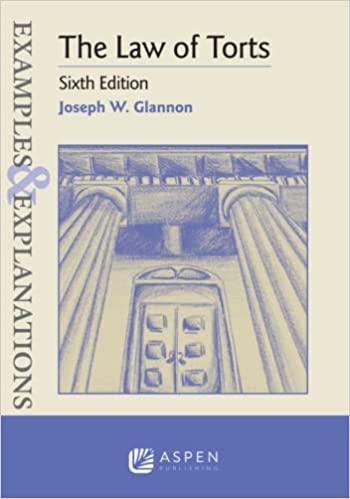Question
On June 1, 2017, Santos, a ninety-three year old woman, was admitted to Hapless Healthcare for rehabilitation of a post-stroke condition. Santos suffered from diabetes,
On June 1, 2017, Santos, a ninety-three year old woman, was admitted to Hapless Healthcare for rehabilitation of a post-stroke condition. Santos suffered from diabetes, high blood pressure, coronary artery disease, and congestive heart failure. On the morning of June 4, 2017, a registered nurse, and a certified nurse's aide discovered that Santos's lower right leg was cool and did not have a pulse. At noon, Santos was transferred to the emergency room at Hapless Regional Hospital, and she underwent an embolectomy to remove an embolism that had developed in her right leg. During the procedure, the surgeon discovered that Santos's right leg was pregangrenous and amputated it above-the-knee.
For her lawsuit Hapless Healthcare, Santos hired a competent, qualified expert witness who opined, in part:
In order to meet the standards of care in this case, Santos should have had a daily body check. This means examination of the upper extremities and the lower extremities and her body for evidence of edema, skin integrity, and whether the skin was dry, evidence of abrasions, tears, ulcers, and the temperature of the skin.
In this case when the cold right leg was noted, her physician was notified. The problem is that the arterial occlusion of the right leg more likely than not occurred 24-36 hours prior to its discovery. This is evidenced by the fact that her leg was beyond salvage when she first arrived at the hospital. By the time Santos arrived at Hapless Medical Center, her leg was beyond salvage and there was no option, but to amputate her leg. If the arterial occlusion had been discovered earlier, then more likely than not, her leg could have been salvaged by the performance of an embolectomy.
Defendant has a very strong argument that plaintiff's expert has failed to establish:
A. Duty (the standard of care)
B. Breach
C. Causation
D. None of the above
Step by Step Solution
There are 3 Steps involved in it
Step: 1

Get Instant Access to Expert-Tailored Solutions
See step-by-step solutions with expert insights and AI powered tools for academic success
Step: 2

Step: 3

Ace Your Homework with AI
Get the answers you need in no time with our AI-driven, step-by-step assistance
Get Started


